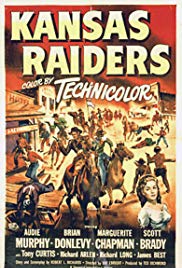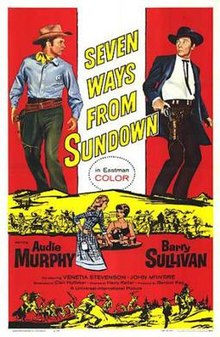
A game-legged old man and a drunk. That’s all you got? In the American west, small-town sheriff John T. Chance (John Wayne) enlists the help of Stumpy, a cripple (Walter Brennan), Dude, a drunk (Dean Martin), and Colorado Ryan, a young gunfighter (Ricky Nelson) in his efforts to hold in jail the brother Jack (Claude Akins) of the local bad guy, Nathan Burdette (John Russell) until the marshal arrives, while dealing with card sharp Feathers (Angie Dickinson) who swears she’s leaving town on the next stage. Then the outlaws arrive … Let’s get this straight. You don’t like? I don’t like a lot of things. I don’t like your men sittin’ on the road bottling up this town. I don’t like your men watching us, trying to catch us with our backs turned. And I don’t like it when a friend of mine offers to help and twenty minutes later he’s dead! And i don’t like you, Burdette, because you set it up. Producer/director Howard Hawks had been in Europe for four years and came back to find that US TV now boasted several filmed TV series each night, mostly westerns, one even starring The Thing (James Arness), Gunsmoke. He didn’t like the politics of High Noon or 3.10 to Yuma so took the scenes he disliked and turned them around, inverting their meaning and attitude, in this story starring a man called Chance (named for the 20 year old Chanel model Hawks met in Paris and who would remain with him until his death twenty years later). Written by Jules Furthman and Leigh Brackett, this is one of the most relaxed yet keenly felt chamber westerns, so laid back and laconic in its reversals you nearly don’t notice how little people say, because what they do, even the simplest gesture, is replete with meaning, especially when it involves cigarettes. Furthman and Brackett had both worked on The Big Sleep but never actually met. He had more or less retired and she had become a sci-fi novelist. He didn’t like to do any writing per se so he and Hawks would discuss ideas while Brackett would type them up, rework them and make her own contributions, so that the first draft screenplay bore her name alone. Furthman was on set and helped Hawks rewrite while the director encouraged the cast to improvise, a speciality of Brennan’s; Wayne preferred to have his lines given to him and he was a quick study. Nelson was given some of Montgomery Clift’s tics from Red River so he would have something to do with his hands. Hawks was so in tune with what the TV audience wanted that he cast Ward Bond (from Wagon Train) in his final role as Chance’s friend Pat Wheeler, Russell (Lawman), Pedro Gonzalez-Gonzalez as hotel proprietor Carlos Robante (from You Bet Your Life), Dickinson had recently appeared in a Perry Mason episode directed by Christian Nyby and of course Brennan (The McCoys). Hawks noticed The Adventures of Ozzie and Harriet was hugely popular and cast 17-year old Nelson, believing he could do the kind of box office numbers that Elvis was doing. His 18th birthday happened on set and the hard-drinking Big Guy cast (all the principals plus Hawks himself stood over six feet) gave him 300lbs of steer manure which they duly threw him into. Hawks trusted Martin to produce the goods when the singer arrived for a meeting at 8.30AM on the lot in LA after performing a midnight show in Vegas because he wanted the part so badly. The script reworked several ideas, characters, relationships and plot points from Hawks’ previous films (mainly with Furthman) in recycling Underworld, Gunga Din, To Have and Have Not and Red River. And what an entrance Dickinson has – inviting Wayne to disrobe her when he suspects her of hiding three missing cards after fleecing a friend of his at the table. Their sparring is really something, her teasing leaving him at sixes and sevens. Brennan is simply adorable as Stumpy, the ol’ toothless guy that can, while hotshot Nelson and cleaned up drunk Martin even get to sing a couple of songs in between firing off those six-shooters – music is particularly important here with Dimitri Tiomkin (hired despite working on High Noon!) reworking De Guello as the haunting melody from the Alamo (and Wayne would use it in his own take on The Alamo the following year). Wayne is more himself than ever, ambling through the sequences, always doing the right thing, taking care of people, using that pump action rifle to even the score as he walks back and forth up and down the main street of the Old Tucson set (from Arizona) to see to things in the jail and see to his girl in the hotel, back and forth, back and forth. Sheer genius. A hugely influential American classic that is not just expressive filmmaking, it is also entertainment of the highest order. If I ever saw a man holdin’ a bull by the tail, you’re it. MM#2900








